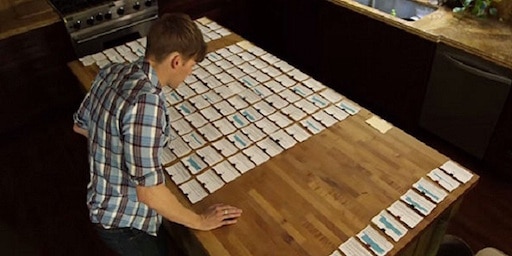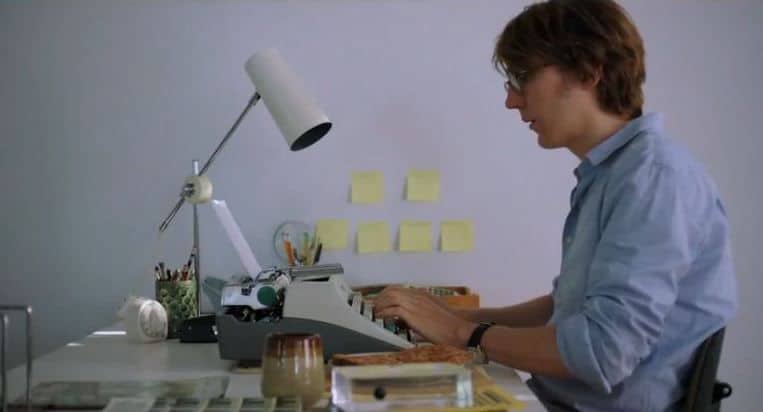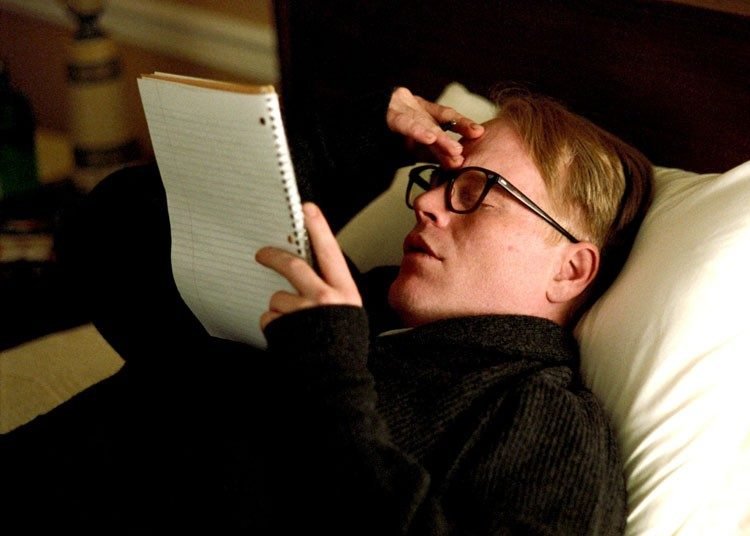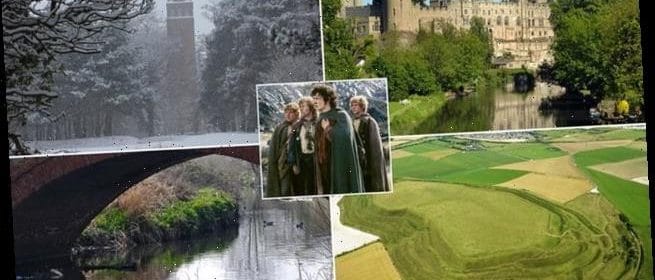There is a lot of advice on the screenwriting process but screenplay research and the act of finding, gathering and implementing information into your writing is a little more shrouded in mystery.
Sometimes the subject matter and characters you’re writing about are very familiar to you and you can simply draw on what you already know. But other times you may need to write about something or someone very different from your own personal experiences, and then you’re faced with the task of research.
Screenplay research is a critical factor in developing a compelling story. It is also completely necessary to avoid distracting falsities or constant, endless re-writes.
Whether studying the world that your fictional character will inhabit or learning about a real-life figure or event, research is imperative to create a world that is authentic, specific and vivid.
Good research is the key to a great script.
Bad research is a waste of time.
The research stages of a screenplay also allow the writer to build from the material. It is through these details that we find both originality and universality.
If you find yourself wandering away from your main quest, these techniques will help you find your way back to your goal: finishing that epic screenplay and handing in your final draft or first draft.
Table of Contents
- 10 Essential Elements of Screenplay Research
- 1. Make an Outline For Your Script
- 2. Plan What You Need to Research
- 3. Dedicate Time For Your Screenplay Research
- 4. Use Movies, TV Shows and Scripts
- 5. Use a Range of Sources
- 6. Talk to People
- 7. Keep Your Screenplay Research Organized
- 8. Write While You Research Your Screenplay
- 9. Keep it Simple & Dramatic
- 10. Don’t Let Screenplay Research Dictate Your Story
- Screenplay Research – In Conclusion
- In Summary
10 Essential Elements of Screenplay Research
1. Make an Outline For Your Script
Whether you are writing from experience or you have been given the job of writing a script, having an outline or logline of the basic storyline of your script is vital to keep your research focused.
In a few sentences, write the basic action of the plot.
For example, if your story were Finding Nemo, you might write: “After his son is captured in the Great Barrier Reef and taken to Sydney, a timid clownfish sets out on a journey to bring him home.”
Ask yourself: What’s the basic story of my screenplay?
Researching without having a clear understanding of what the story is going to be about will leave you susceptible to losing yourself in the rabbit hole that is research.
An outline stating the characters, what happens to them and how it ends is a great way of checking whether your research is staying relevant. It gives you a direction to head in and a grounding for your research.
This will also allow you to focus on specific details.
2. Plan What You Need to Research

Next, the development of a plan. Make a list of specific issues or facts you need to research and use it as a guide to saving time.
If you’re working to a deadline, a plan will allow you to make the most of your deadline.
However, having fewer time restraints and more ground to cover could leave you feeling overwhelmed. Therefore, having a plan will give you a good basis to take stock of whether the research material is relevant to your narrative or not.
Examples of the types of questions you might want to ask yourself during this stage are as follows:
- What is the era the story takes place in?
- Where is it set?
- What are the politics, culture, art and even restaurants of a certain place?
- Is there a dialect?
- What are the occupational details of your characters?
Relevance should always be your magnetic north.
Organizing your research by making a plan will allow you to focus your research so you don’t become flooded with unessential details. Go in, get what you need and get out. Relevance should always be your magnetic north.
3. Dedicate Time For Your Screenplay Research
A mistake screenwriters make when researching their screenplay is not allocating specific time. This can lead to procrastination.
Treat your research like work. Grab your highlighters, post-it notes and folders and dedicate time solely for research.
Whether you research heavily for 2-3 months before starting your screenplay or you research throughout, you need to dedicate a specific time and sometimes environment for your research.

If you are the first type of writer, you should set a deadline in your diary or calendar. Making it a written commitment helps to anchor your goals. Maybe even ask a friend or writing peer to act as your accountability buddy.
If you are the second type of writer, you should also set aside hours of the day that you dedicate solely to researching.
- For those who get so engrossed in their research that they lose awareness of space and time – set a timer. Having an alarm snap you out of your research zone can be a loud reminder that you need to get back to your writing and ensure you don’t get side-tracked.
- If you find it extremely difficult to move from researching to writing in the same day and you have the access to multiple devices, you can use a separate device to research on. Keeping separate workspaces for research and drafting helps organize and prioritize your workflow.
4. Use Movies, TV Shows and Scripts
If you’re writing a screenplay, it’s important to watch other movies and TV shows that are similar to your genre or that depict certain characters.
Research isn’t just about facts, it’s also about immersing yourself in a world, understanding the set of appropriate behaviours, plots, cultural norms and getting to know your elements inside-out. That is research.
The Internet Movie Database is a vital resource for a writer researching a screenplay subject. You can search by keyword and find every movie and TV show ever made that shares an element of your story.
Watch both good and bad movies and TV shows. Take notes of the characters, plot dialogue and why they worked or didn’t work. Learn from them all.

Seeing how other screenwriters explore similar elements will build your visual research and feed your brain with imagery and context needed to keep your story original.
Likewise, the act of reading scripts is a great source of information and valuable resource for understanding script structure (although you should be doing this anyway).
Reading screenplays will not only get you closer to the starting point but it will allow you to once again take notes and make more connections.
Embedding yourself within a certain genre, a specific character type or a particular world that your characters inhabit will saturate your brain with relevant information which will make the writing phase much easier. All this visual information will have been installed in your mind. It’s a prism through which you’re writing.
If you’re seeking access to great scripts, check out our scripts pack containing over 1,000 produced scripts.
5. Use a Range of Sources
Just because you’re writing for the screen doesn’t mean you only research movies and television. Researching for a screenplay will require you to venture out of the screen world and use other resources.
Read books, magazine articles, Wikipedia pages, online articles; watch interviews, documentaries, the news; listen to podcasts, music, and more.
The Internet is an essential resource for information. By entering your search term into search engines you’ll find articles, Wikipedia pages and forums dedicated to occupations and specialists.
- YouTube can be very invaluable with a vast collection of videos with people sharing their own experiences. Just be wary of getting lost in a three-hour-long video binge. As always, keep focused and keep to the task at hand.
- Libraries are a great source of inspiration too as they have entire archives dedicated to books on specific topics. This is when knowing your era is important.
The handy part of using “scholarly” sources is the bibliography page. This list is a collection of everything the book’s author read and drew upon. Use the work and research other storytellers have done before you: write down the titles and build on your branches of material.

Podcasts can also be a great form of research. There are a ton of interviews ready and waiting for you, full of great, specific characters and dialogue.
These bite-sized nuggets of information explore a myriad of topics and genres including true crime. Just think how you could mine an interview for screenplay research. You could use the jargon and procedural insight to write a more authentic detective character, for example.
Your research phase is all about saturating your brain with information from all kinds of sources, embedding yourself in a specific niche, world or subject.
6. Talk to People
A very rewarding method of research and one where you can make sure your specific questions are answered, is talking to people.
- Conversations with someone from a certain profession, who lived in the era or place you are researching will help to create convincing characters.
- You may even decide to shadow a certain profession to better understand their day-to-day experiences.

When Paul Schrader wrote Taxi Driver, he spent weeks driving a taxi around NYC to get a feeling of the culture.
- He asked: How do cab drivers talk? What do they talk about among themselves? What is the lingo and jargon? How do they feel about the city? What do they eat when they are on break?
Personal interviews are key as well. Find police officers, doctors, soldiers, office managers, car salespeople, teachers, or even individuals who experienced a certain event you are researching to interview.
Ticks or traits that you see during their interviews can turn into some fantastic characterisation.
The material that you can get from them including anecdotes and even personal ticks or traits that you see during their interviews can turn into some fantastic characterisation.
If possible, don’t be shy about conducting interviews with individuals you can track down. Not everyone will want to talk to you but surely somebody will. Who knows what these interviewees will tell you? What was left out of the history books? You have your own first-hand research accessible to no other writer on the planet.
As ever, just make sure you are respectful of those you interview and the information you will eventually use in your screenplay, obtaining permission, respect and a mutual understanding.
7. Keep Your Screenplay Research Organized
Staying organized is important in everything you do as a screenwriter and it is especially important during the research stages of a screenplay.
Keeping a note of the materials and information found will ensure the dedicated time you took to research isn’t wasted.
You may be a fan of the old school methods of using highlighters, post-it notes and colour-coded folders. However, there have been many advancements in the world of organization.
With a variety of websites and apps to download that make your note-taking and research easier, you’d be a fool not to try.
For example…
- Evernote is a great app for online organization with tools to share ideas, favourite articles, documents, images and videos. The ability to categorize and create collaborative boards makes it a fantastic app for those working with other writers.
- Trello is the ultimate workflow organizer that works in the visual way that screenwriters often think.

This app allows you to organize your projects through lists and drag cards in various stages of your project. It’s useful for organizing all parts of your screenwriting process from arranging interviews to storing articles, to scheduling films and TV shows you need to watch.
Whether you are writing a true story or not, keeping track of your research including facts, locations and specific dates will help when writing your story. It’s also smart to keep notes of your sources in case you need to return to them or for fact-checking purposes.
8. Write While You Research Your Screenplay
“If you want to be a writer, you must do two things above all others: read a lot and write a lot. There’s no way around these two things that I’m aware of, no shortcut.”
Stephen King
Spending TOO MUCH time on your screenplay research can leave the role of writing seem like a far away and more daunting task. Falling into the trap that you must finish your research before starting will inevitably leave your screenplay incomplete.
Writing while you research for your screenplay will ensure you don’t start to procrastinate under the guise of research.

Getting pen to paper or finger to keyboard is a great way to maintain the balance between research and writing.
- Being able to work in unison where the research and the writing are in conversation with each other will open the possibility for your research to feed your story and vice versa.
- This method may leave your screenplay with large chunks of unwritten material that you will need to return to. However, this will also make your researching role easier as you will know exactly what to research.
This trade-off will ensure you don’t get stuck in the holding period of pre-writing research whilst allowing your creativity to continue and helping to take your ideas to new and interesting places.
9. Keep it Simple & Dramatic
Research isn’t about copying and pasting facts into your screenplay.
You may feel as though you want to show off everything you’ve learnt. You’re proud of your research and you put in a lot of effort to understand the courtroom procedure, for example.
However, it’s important that your research doesn’t take over your ability to connect to your readers.

Adding too many facts and fixations into your screenplay will leave it weak as the reader will spend more time breaking down the details than making emotional connections.
Be wary of exposition here. It’s easy to feel beholden to the facts you are trying to convey. But always remember that the drama must come first. This is the purpose of your script. It’s not merely a Wikipedia page come to life.
Research should augment your story, not replace it.
Keeping it simple will allow you to create the best possible reading experience for any agent, manager, producer, development executive, contest judge, or major talent.
And beyond the experience of the reader, this technique will also create the best cinematic experience for the audience.
When your goal is to communicate what the reader should be envisioning effectively, you need to do so as efficiently as possible in the stage directions. Research should augment your story, not replace it.
Overly complicated word choices, terminology, and drawn out scene descriptions can make the read come to a screeching halt.
Remember, the research is there so the elements of your story are real enough to not be distracting.
10. Don’t Let Screenplay Research Dictate Your Story
Sometimes after a lot of research, a writer may feel as though their creative vision has been stomped on by facts and realities, debunking a certain scene from happening in real life.
“Where artistic license and scientific plausibility meld”
Adam Hadhazy
But remember, you don’t have to write a 100% factually true screenplay, unless you are writing a documentary of course.
J.R.R Tolkien and James Cameron didn’t let the fact that their stories were entirely fictional stop them from ensuring the Shire and Pandora felt just as possible as our “true” reality.

Years spent researching and building his knowledge of Christian folklore, myths and fairy tales for inspiration helped Tolkien to create realistic civilisations from scratch.
Avatar’s portrayal of the world in 2154 has elements based on actual scientific research whilst the language spoken by the Na’vi was very much inspired by the Maori language.
Your goal as a screenwriter is to make the story feel authentic whilst allowing your creative ideas freedom to roam.
Screenplay Research – In Conclusion
So remember, research is another important tool in your screenwriter’s arsenal. Sticking by these techniques and tips will ensure that you don’t get distracted by the process, that you take detailed notes and that you move on with the job of writing.
Plus something rather magical has happened during all those hours of research. You have emotionally and experientially prepared yourself to tell that story.
They say, “Write what you know.” Well, with all the research out there as your available resources, you are able to “know” anything. However, knowing something is only half the battle. Realizing this research in a dramatic, convincing and respectful way is the key to a successful screenplay built on research.
In Summary
Screenplay research can be done using different resources including movies and TV shows, scripts, books, the internet and interviewing people, just to name a few.
There are also different techniques to help with researching efficiently and ensure that the time you spent researching isn’t wasted. Tips include making a plan, organizing notes and moving onto the job of writing.
Screenplay research is an important step in developing a compelling story that feels authentic enough not to be distracting.
A Script Researcher is involved with checking storylines for accuracy, researching alternative approaches to stories and issues arising from stories as well as writing clear and concise reports of findings.
A Film Researcher typically works with films in pre-production. Their responsibilities include combing through a script to highlight information – names, dates, locations, occupations, historical and cultural references, etc. – that will need to be verified.
– What did you think of this article? Share It, Like It, give it a rating, and let us know your thoughts in the comments box further down…
– Struggling with a script or book? Story analysis is what we do, all day, every day… check out our range of script coverage services for writers & filmmakers.
This article was written by Mariona Foguet-Gonzalez and edited by IS Staff.
Get *ALL* our FREE Resources
Tackle the trickiest areas of screenwriting with our exclusive eBooks. Get all our FREE resources when you join 60,000 filmmakers on our mailing list!

